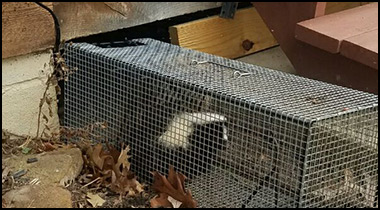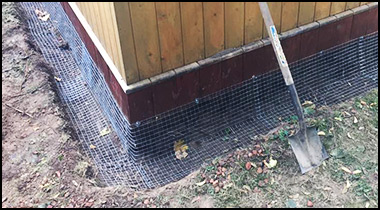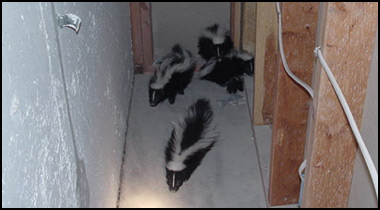Fort Lauderdale Skunk Removal Resources
Skunk Rehabber - South Florida Wildlife Center: (954) 524-4302
Free Broward County Animal Services: 954-359-1313
Humane Wildlife Trappers of Fort Lauderdale: 954-703-5683
If you need skunk control in Fort Lauderdale, you have a few options. First, you can attempt to solve the skunk problem yourself by reading our do-it-yourself guide. If you need outside help, you can also call Broward County Animal Services to see if they have any free resources or help for you - however, they primarily deal with dog and cat concerns. You can also call a local Fort Lauderdale wildlife rehabber, as they are typically a great resource for advice that is in the best welfare of the animal. If as a last resort you must hire a professional company, we recommend Humane Wildlife Trappers of Fort Lauderdale at 954-703-5683. To learn more about them or check their skunk removal prices, visit fortlauderdalepestanimal.com.

Fort Lauderdale Skunk Trapping and Removal

Preventative Repairs & Exclusion

Fort Lauderdale Skunk Removal From Structures
In many cases, preventative measures can solve your Fort Lauderdale skunk problem - keep garbage secured, pet food indoors, and most of all when it comes to skunks, secure the perimeter of your shed, porch, deck, or house with a barrier - lattice or steel mesh is good, and it keeps Florida skunks from going under the structure. If trapping and removal of the skunk is the only option you have, please do so with the help of a local agency or professional company who knows how to do it humanely and legally. Browse the resources of this site for more educational information.
Frequently Asked Questions:
Prevention: How to Keep Skunks Away
What to do with a skunk after I catch it?
Is it legal for me to trap a skunk?
How to remove skunk odor
Is a skunk active during the daytime rabid?
What does skunk feces look like?
Fort Lauderdale Skunk Control Information: Do skunks climb trees or fences?
The Striped Skunk is the most common type in the U.S. This variety, with its long sharp claws, will not, by nature, climb trees, except when they are young and very adventurous. As the skunks age, their long thick claws become a serious disadvantage when climbing trees, but can be an aid to climbing wire fencing like chain link. Now The Spotted Skunk, on the other hand, is a very good climber and can not only scale a fence, but also climb trees. When it scales a tree it can even come back down the tree head first. Spotted skunks not only climb trees regularly (usually in search of bugs like beetles, larvae, and termites) but have been known to scale wooden fences quite easily. The more common Striped skunks prefer to keep their feet on the ground.
You would not likely find them and attempting to climb a fence. The stripped skunks style is much more likely to burrow under the opposing fence -a feat easily accomplished with their long sharp claws, these skunk are renowned diggers. Not only do they have long claws for digging, all Skunks also have very sharp teeth. They have poor eyesight, as they are extremely nearsighted. They make up for their poor eyesight with their keen sense of smell and hearing. So it doesn't really matter that the Striped skunk is not a good climber. If it needs to, say in the case of avoiding danger, it can climb up slanted trees, heavy wire mesh, fences, and some slatted fences, however, its long nails are a definite handicap when it comes to maneuvering.
For skunk and all wildlife removal in Fort Lauderdale, visit www.fortlauderdalepestanimal.com website to learn more.
Skunks can be beneficial to have around because of their diet. They eat a myriad of garden pests, like grasshoppers, termites, and berries, and because you can control their movement with fences, and corral the creatures, the prospect of damage to your plants and property can be minimal. If you do feel a skunk has become a problem, it is best to call a professional to deal with it. They can be aggressive if frightened, and you don't want to get sprayed by one
Remember, for free services you can try (954) 524-4302 or 954-359-1313, but if you need to pay for professional help, check the prices at the fortlauderdalepestanimal.com website. Or follow our do-it-yourself guide!

